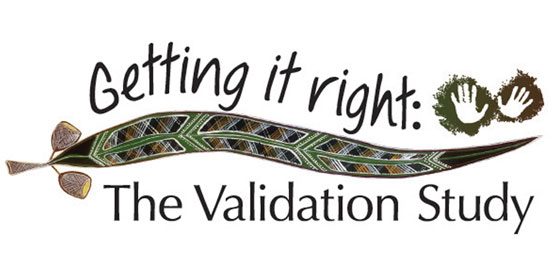
Getting it right: Validation of a culturally-specific measure to identify depression in Aboriginal and Torres Strait Islander people
The primary aim of Getting it right: The Validation Study is to validate an extensively adapted and culturally appropriate, free to use, tool for use with Indigenous people attending primary care services, the adapted nine-item Patient Health Questionnaire (aPHQ-9), against a gold standard (criterion standard) the MINI International Neuropsychiatric Interview (MINI) 6.0.0., as a screening instrument for depression. The secondary aim is to evaluate the level of contribution of seven additional questions to the aPHQ-9 to the diagnosis of depression, as compared to the aPHQ-9.
This cross sectional project will involve 500 Indigenous primary care attendees from Australia’s states and territories. We will validate (criterion validity) the aPHQ-9 as a screening tool, alone, and in combination with the additional seven questions, against a gold standard structured criterion interview for depression MINI International Neuropsychiatric Interview (MINI) 6.0.0., in Indigenous men and women attending primary health care services across Australia.
Issue
There is no culturally meaningful, appropriately valid, simple, free-to-use tool to screen for depression in Aboriginal and Torres Strait Islander peoples attending primary health care in Australia.
In previous work by Professor Alex Brown and others, five Aboriginal language groups of Central Australian Aboriginal men independently selected the 9-item Patient Health Questionnaire (PHQ-9) depression screening tool from a selection of screening tools, as the most appropriate to adapt for use with Indigenous people. The PHQ-9 was adapted to the local needs of all five language groups over 12-months and consensus regarding wording was reached.
The PHQ-9 wording was modified, using simplified English, to make the ‘adapted PHQ-9’ (aPHQ-9) culturally meaningful and give it face validity.
Getting it right: The Validation Study study aims to validate this tool.
Methods
This will provide the evidence on whether to recommend use of the aPHQ-9 as a screening tool for depression in health services research, clinical care delivery and policy evaluation in Federal and State chronic diseases programmes.
Progress
Recruitment for Getting it Right was completed in November 2016. The target of 500 participants from 10 primary healthcare services from around Australia was reached. Data analyses are underway.
Related People
-
Professor Nick Glozier
-
Professor Alan Cass
Menzies School of Health Research, Darwin -
Professor Timothy Skinner
Charles Darwin University, Darwin -
Dr Armando Teixeira-Pinto
The University of Sydney, Sydney -
Associate Professor Deborah Askew
Queensland Health, Queensland -
Professor Alex Brown
South Australian Health and Medical Research Institute, Adelaide


